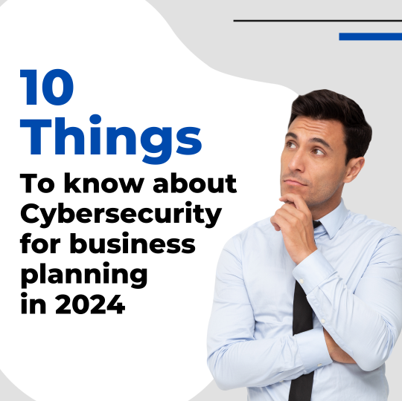 Are you already thinking about your business plans for 2024? As the year comes to a close, it can be a busy time trying to wrap up the quarter and prepare for the upcoming year. However, amidst all the chaos, it’s important not to overlook the significance of cybersecurity planning. Many small business owners tend to neglect this aspect when developing their strategies for the new year. It’s crucial to remember that cybersecurity is not just an IT concern, but a critical business decision. The success of your company relies on your ability to safeguard your data, as well as your clients’ information, from potential cyber threats.
Are you already thinking about your business plans for 2024? As the year comes to a close, it can be a busy time trying to wrap up the quarter and prepare for the upcoming year. However, amidst all the chaos, it’s important not to overlook the significance of cybersecurity planning. Many small business owners tend to neglect this aspect when developing their strategies for the new year. It’s crucial to remember that cybersecurity is not just an IT concern, but a critical business decision. The success of your company relies on your ability to safeguard your data, as well as your clients’ information, from potential cyber threats.
In order to develop a dependable strategy for the upcoming year, there are a few cybersecurity basics that every business owner needs to be aware of to avoid becoming the next victim of a data breach. Given the increasing frequency of cyber threats, it is important to remain vigilant and not underestimate the potential consequences of such breaches.
Here are 10 BIG takeaways about cybersecurity that you should keep in mind. Your security depends on it!
1. No business is too small.
Small business owners are often seen as easy targets by hackers who take advantage of their belief that they are not at risk. This is a dangerous misconception, as any business with money or data is vulnerable to cyber-attacks.
Takeaway – Protect your business and consult a cybersecurity expert on what you need.
2. Your employees are putting you at risk.
Human error is the main culprit behind cybercrime, often unintentional. Clicking on harmful links or downloading malicious attachments are common examples of these mistakes, which can have severe consequences for your business.
Takeaway – Invest some of your budget in cybersecurity training for your team.
3. Software needs to be updated when you’re notified about it.
This is true for your web browsers, as well. Receiving a notification about an available update usually indicates the need to fix a bug or vulnerability. Neglecting to patch it allows for potential exposure in your network that can be exploited by hackers.
Takeaway – Have your IT team run automatic updates and always manually update if prompted.
4. Back up your data.
Unexpected events can occur, whether it be a natural disaster such as a tornado or flood destroying your workplace, or a cyber-attack that locks down your network and demands a ransom for its release. By having a backup, you can minimize the amount of time your business is down and prevent further harm.
Takeaway – Have an off-site backup and test it regularly to ensure it works properly.
5. Use a VPN when working outside of the office.
If you’re away on vacation, working remotely, or just grabbing a coffee at a local shop, connecting to public Wi-Fi can be dangerous. Cybercriminals can easily hack into unsecured networks or create fake ones, luring unsuspecting users to connect and putting their personal information at risk.
Takeaway – Use a VPN, or virtual private network, to keep your network safe from hackers while on the go.
6. Data breaches are expensive.
Small businesses that fall victim to data breaches often face dire consequences, with the financial impact being significant enough to force them to shut down within six months. The financial losses incurred can vary greatly, ranging from hundreds of thousands to millions of dollars, depending on the extent of damage caused.
Takeaway – Invest in cybersecurity. Don’t play around and risk everything you worked hard to build.
7. Having cyber insurance doesn’t mean you’re covered if you’re hacked.
Cyber insurance may not provide automatic coverage in case of a hack. Insurance agents will check to make sure you’ve done everything in your power to prevent the attack. If you haven’t, your claim could be denied.
Takeaway – Read the fine print on cyber insurance policies and comply with all requirements.
8. Compliance doesn’t mean you’re secure.
Being compliant signifies that you have met all the criteria set by the government, but it’s important to remember that it doesn’t guarantee complete security. Compliance simply implies that you have established a solid foundation by implementing the essential measures.
Takeaway – Seek guidance from a cybersecurity professional who deals with clients in your industry. They can help ensure that your organization is both compliant and equipped with the necessary security systems to safeguard your business.
9. Basic antivirus and firewalls are not enough.
While these tools can be beneficial, they alone cannot guarantee your security. Cybercriminals are constantly discovering new methods to bypass these software defenses so, if you’re not implementing other security measures, you leave yourself vulnerable to potential risks.
Takeaway – Seek advice from a cybersecurity expert to determine your requirements. Contrary to popular belief, the cost is often more affordable than expected and will save you a significant amount in the event of a data breach.
10. You’ll be the one who people hold accountable if you’re hacked.
Regardless of fault, data breaches often result in customers, employees, attorneys, and the media placing blame on you, leading to an unpleasant situation.
Takeaway – To avoid this, adopt a proactive stance towards cybersecurity.
Ensure your security is a top priority in 2024. We offer a FREE, no-obligation Security Assessment. Even if you are already partnered with a cybersecurity company, it is always beneficial to seek a second expert opinion to identify any potential vulnerabilities and areas susceptible to attacks.
We have limited spots available and expect to fill up before the holiday break, so if you’re interested, click here to book your assessment with our team now.



